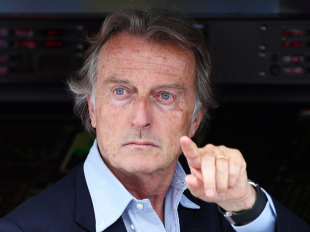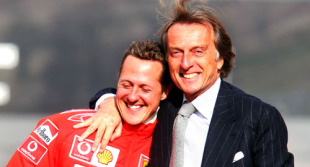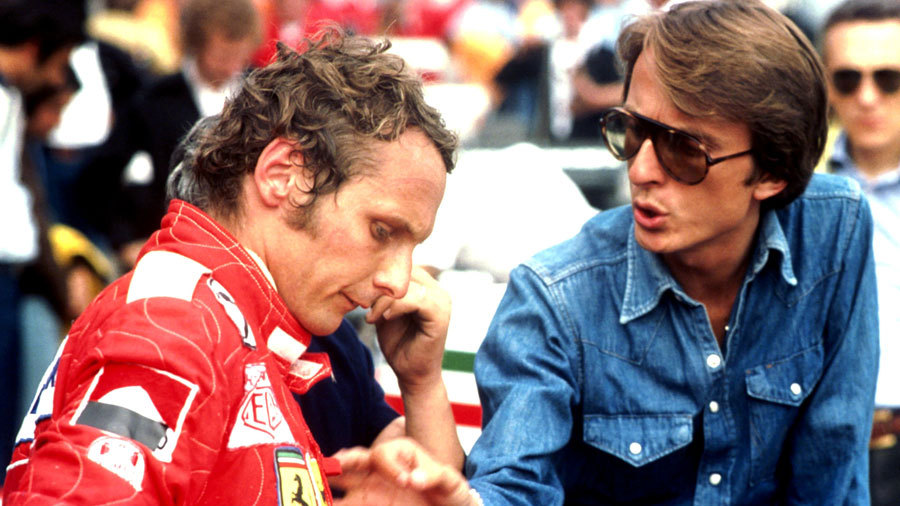

Whatever may be said about Luca Cordero di Montezemolo, he will be missed by F1 writers and broadcasters. His presence at the race track could be interpreted as anything between captivating and comic, depending on the state of Ferrari at the time. Inevitably, you could not resist finding out which facet of his character was being enacted with appropriate drama on that particular day.
Montezemolo's personality was magnetic, and doubtless will remain so should he choose to put in future appearances as the former chairman of a team he saved, not once but twice. He should be remembered for those achievements rather than recent and occasionally foolish outbursts and reactions generated by frustration over another disappointing season for his beloved team.
F1 first became aware of the lean young man with the flicked back hair when he accepted responsibility for turning Ferrari around after one of its spasmodic periods spent crashing around like a rudderless ship in the early 1970s. The nephew of FIAT boss Gianni Agnelli, Montezemolo had progressed through law school in America and the legal department at FIAT.
He was just 26 when his arrival in the Ferrari garage in 1974 coincided with that of Niki Lauda, the pair - along with the 312 B3, a massive improvement on the previous models - almost winning the title first time out, and then getting the job done in 1975. But for Lauda's terrible accident on the Nürburgring Nordschleife, there would certainly have been a repeat in 1976, Lauda making sure of his second championship the following year.
Montezemolo advanced to senior management within FIAT, enjoying a spell in charge of drinks company Cinzano and as organiser of the soccer World Cup in 1990. By which time, the Ferrari team had returned to chaos and Montezemolo was asked to ride to the rescue once more on his metaphorical prancing horse.
Montezemolo was not afraid to delegate in order to bring method to the madness as the team pulled in several directions at once, each department blaming the others for three seasons without a win, never mind a championship. A key move was the installation of Jean Todt as team manager even though, in some deeply entrenched quarters of the Ferrari establishment, employing a Frenchman for such an important role amounted to heresy.
Undaunted, Montezemolo loosened the FIAT purse strings and talked Marlboro into assisting with the fee necessary to meet Todt's request to have Michael Schumacher, then a double world championship, jump ship from Benetton. The subsequent arrival of Ross Brawn and Rory Byrne ensured everything was in place.
Under Montezemolo's watch, Ferrari had changed and yet, in some respects, it had not changed at all as rampant expectation continued to undermine the best laid plans. An initial run of failure in 1996, as the Ferraris retired more often than they finished, prompted Gazzetta dello Sport to write: 'This mythical car, which had made motor racing history, seems to have become a circus car, exploding in the hands of clowns'. The alleged ringmaster, having heard it all before, merely flicked back the locks and engaged in equally smooth rhetoric. Ultimately, he was to be proved correct, even if the acquisition of the first of five consecutive titles in 2000 took an agonisingly long time.

You could say the same for an impassioned speech Montezemolo gave to the media when we gathered in Maranello in November 2002. The purpose of the invitation was to show that Ferrari's determination had been heightened rather than diluted by a hat trick of driver's titles and four successive constructor's championships. In a room next door to Enzo Ferrari's famous farmhouse within the Fiorano complex, Montezemolo spoke for the best part of an hour and without the aid of notes. It was the usual smooth, evocative, sometimes emotional, occasionally repetitive, frequently poignant performance from a master of his craft.
It reminded me of a dinner Montezemolo had thrown for a group of British writers in Castle Ashby in Northamptonshire. We were never certain of the reason behind the invitation and were no wiser after a monologue spread across a meal of several courses. But we concluded, as ever, that it had been wonderful to behold.
In recent years, increased sales and profits in the road car division had done the talking on behalf of the Ferrari president. But it now seems that not even Montezemolo's eloquence could mend a disagreement with Sergio Marchionne, the FIAT boss, over road car marketing and the dearth of results on the track.
Doubtless it can be argued that the time had come for the 67-year-old to move on after 23 years as chairman. An era has ended for a man who achieved a great deal but for whom being aristocratic, suave and sophisticated is no longer enough. Ferrari may be the winner but F1's diminishing stock of characters is the unfortunate loser.

Maurice Hamilton writes for ESPN F1.
© ESPN Sports Media Ltd.
 Maurice Hamilton writes for ESPN F1. A veteran journalist in the paddock, Maurice Hamilton has been part of the Formula One scene since 1977 and was the Observer's motor racing correspondent for 20 years. He has written several books as well as commentating on Formula One for BBC Radio 5 Live
Maurice Hamilton writes for ESPN F1. A veteran journalist in the paddock, Maurice Hamilton has been part of the Formula One scene since 1977 and was the Observer's motor racing correspondent for 20 years. He has written several books as well as commentating on Formula One for BBC Radio 5 Live
